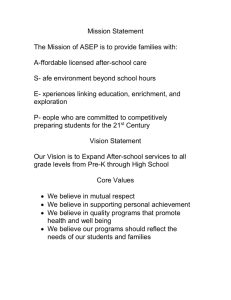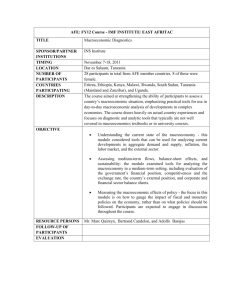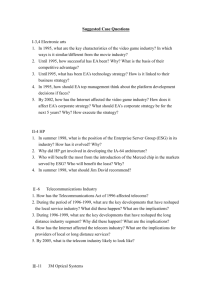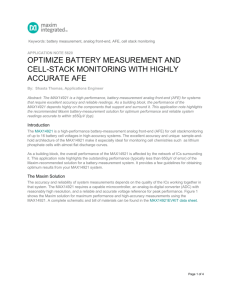Document 10289288
advertisement
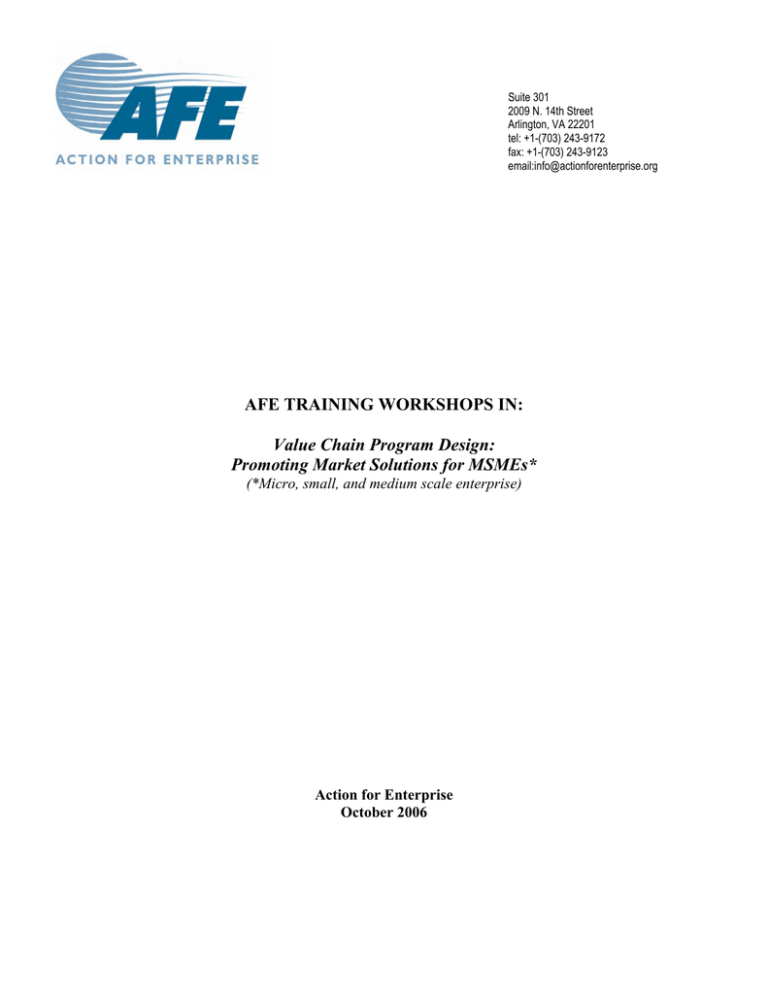
Suite 301 2009 N. 14th Street Arlington, VA 22201 tel: +1-(703) 243-9172 fax: +1-(703) 243-9123 email:info@actionforenterprise.org AFE TRAINING WORKSHOPS IN: Value Chain Program Design: Promoting Market Solutions for MSMEs* (*Micro, small, and medium scale enterprise) Action for Enterprise October 2006 Action for Enterprise (AFE) Training Workshop Page ii TABLE OF CONTENTS A. EXECUTIVE SUMMARY ................................................................................................ 1 B. TRAINING PROGRAM OVERVIEW .............................................................................. 2 C. KEY PERSONNEL ............................................................................................................ 7 D. CAPABILITY STATEMENT ............................................................................................ 9 Action for Enterprise (AFE) Training Workshop A. Page 1 SUMMARY Throughout the donor and development community, there is recognition that the impact of traditional approaches to micro, small, and medium-scale enterprise (MSME) development have been limited. As a result of the need for greater and more sustainable impact, improved approaches that target specific industries and promote sustainable solutions have emerged over the past few years. To respond to the need to train development professionals in these new approaches, Action for Enterprise (AFE) is offering a series of five-day training workshops that present the latest methodologies and practice for designing value chain programs that incorporate strategies for sustainable impact. These trainings are based on a successful workshop model that AFE has conducted worldwide for over 500 participants. AFE improves the training after each delivery to incorporate participant feedback and ensure that latest tools and knowledge are included. The training targets a range of participants—mainly senior-level staff at development projects, NGOs, consulting firms, donors, and other local and international organizations involved in MSME development programs. The AFE program presents tools and methodologies for program design that combine the strengths of value chain/subsector analysis with methods for identifying commercially viable market solutions that promote MSME and industry competitiveness1. Participants are exposed to a wide range of interventions designed to promote sustainable market-based solutions in the areas of : market access, input supply, technology/product development, management training, policy reform, and access to finance. The AFE training is based on a five-step approach to program design with distinct sessions for each step. Although elements of this approach have been used by donors and practitioners in the past, systematic application of all of these steps in a comprehensive manner is relatively new. The major steps involved in the approach are presented graphically in Figure 1. below: 1 For more details on this approach can be found in the “Promotion of Commercially Viable Solutions to Subsector and Business Constraints” by F. Lusby and H. Panlibuton, March 2004 update. The paper can be downloaded at www.actionforenterprise.org. Action for Enterprise (AFE) Training Workshop Page 2 FIGURE 1. Program Design Steps Step 1: Subsector/ Value Chain Selection Step 5: Identification and Selection of Interventions Step 2: Value Chain Analysis Step 4: Assessment of Market Solutions Step 3: Identification of Market Solutions For each of these program design steps, AFE presents: (i) latest tools, concepts, and best practices from the field of MSME development; and (ii) an exercise in which participants (in small groups of 6 or less) apply the tools and concepts to a case study. This is a very practical, hands-on type of training designed to give participants “how to” skills. For that reason participation is limited to 25 participants per training. B. TRAINING PROGRAM OVERVIEW B.1 Approach/Methodology AFE has pioneered the design and delivery of tools and methodologies that combine the strengths of subsector/value chain analysis with methods for identifying commercially viable market solutions that promote MSME and industry competitiveness. These tools allow practitioners to understand market dynamics, identify major constraints and opportunities, and promote sustainable market-based solutions to identified constraints. Action for Enterprise (AFE) Training Workshop Page 3 The AFE training is based on a five-step approach that presents these tools and methodologies. A distinct training session is conducted for each step. A brief decription of each of these sessions along with accompanying training objectives is presented below. Opening and Introduction Session: During this opening session, participants are introduced to one another and review the overall goals and expected results from the training program. Participants also explore some of the latest terms and concepts used in enterprise development. It is anticipated that by the end of this session, participants will be able to: • Describe general terms and concepts related to: o value chain/subsector development o advantages and disadvantages of a value chain approach o the rationale for a shift to more sustainable (commercially viable) solutions to MSME constraints o the distinction between provider and facilitator • List the key steps in the design of a value chain development program Session 1: Subsector/ Value Chain Selection (Step 1): During this session, participants review techniques for identifying promising subsector/value chains. Illustrative selection criteria are reviewed including: y Unmet demand in the market for particular products y Potential for increase in household incomes y Number of MSMEs in the value chain y Potential for employment generation y Existence of linkages conducive to inter-firm collaboration y Potential for positive coordination and synergy with donors and government y Representation of women in the value chain Once criteria are established they can be used to compare different value chains. Those that rank the highest can then be chosen for more detailed analysis. It is anticipated that by the end of this session, participants will be able to: • List examples of subsector/value chain selection criteria • Describe tools to narrow down and prioritize value chain candidates • List sources of information to identify value chain candidates Session 2: Value Chain Analysis (Step 2): During this session, participants gain a greater understanding of how to analyze market trends and industry dynamics including value chain participants, their roles, and interrelationships. The goal of this step in the approach is to determine key issues hindering MSME growth and competitiveness. Participants discuss how a value chain map can graphically present all the relevant private sector actors and their relationships with one another. Based on the initial findings of this map, interviews with market participants and “key informants” are conducted to identify major constraints and opportunities in the areas of market access, input supply, technology/product Action for Enterprise (AFE) Training Workshop Page 4 development, management and organization, policy, finance, and infrastructure. This is combined with an understanding of value chain governance structures and methods of inter-firm cooperation. It is anticipated that by the end of this session, participants will be able to: • Describe the objectives of carrying out value chain analysis. • Describe different elements of value chain analysis: o value chain mapping o inter-firm relationships o governance structures o categories of value chain constraints o market trends and competitiveness • Describe how value chain analysis fits into the larger framework of program design Session 3: Identification and Selection of Market Solutions (Step 3): During this session, participants learn to identify commercial viable market solutions (potential at this point) that can contribute to competitiveness of the targeted value chain and address the constraints and opportunities identified in Step 2. Techniques for identifying and prioritizing these market solutions are also presented. It is anticipated that by the end of this session, participants will be able to: • Identify sustainable market solutions that can help promote the competitiveness of targeted value chains • Use a “Short-Listing Matrix" to narrow down selected market solutions for further assessment Session 4: Assessment of Market Solutions (Step 4): During this session, participants learn to assess the market-based solutions identified in Step 3. Areas of assessment include: • identification of existing/potential providers of targeted market solutions • constraints to commercially viable (sustainable) provision/use of the targeted solutions • satisfaction with and awareness of market solutions currently provided • the number of MSMEs that could benefit from the market solution Participants learn how to identify providers of market solutions as well as how to determine whether those providers can provide market solutions to MSMEs in a commercially viable/sustainable manner. Discussions include the provision of "embedded" services by lead firms to MSMEs that take place as part of their commercial transactions. Participants also learn how to choose providers to target for program assistance. It is anticipated that by the end of this session, participants will be able to: • Describe the importance of assessing market-based solutions to value chain constraints • Describe the basic elements that comprise the assessment of a market solution • Describe the importance of assessing the commercial viability of a market solution • Describe different techniques to collect information for market solution assessments Action for Enterprise (AFE) Training Workshop Page 5 Session 5: Identification and Selection of Interventions (Step 5): During this session, participants are exposed to different kinds of program interventions that can support MSME and value chain development. Examples are given on how programs can build the capacity of lead firms and others (market solution providers) to better address the constraints of their industry and the upgrading needs of MSMEs. Participants learn techniques for identifying program interventions through focus group discussions with representatives from various actors in the targeted value chain. These include how these actors can validate information from the program design exercise and propose interventions based on the realities in their industry. Participants then learn to identify and select appropriate facilitation activities which will promote sustainable solutions to value chain constraints and enhance the overall competitiveness of participating MSMEs. It is anticipated that by the end of this session, participants will be able to: • Describe guiding principles of value chain programs that seek to improve competitiveness and benefit MSMEs through sustainable market-based solutions • Describe intervention strategies for value chain development programs • Describe the importance of focus group discussions in identifying program interventions • List criteria for selecting interventions Session 6: Performance Measurement: The final session presents a framework for designing performance measurement systems for enterprise development programs. Participants discuss current issues in monitoring and impact evaluation. It is anticipated that by the end of this session, participants will be able to: • Describe why it is important to measure performance of value chain/MSME development programs. • Describe at what levels performance should be measured. • List examples of performance measurement indicators Training Evaluation Methodology: AFE utilizes participatory tools to assess training participant satisfaction and knowledge acquisition after each session of the training program. A formal questionnaire to evaluate the overall content, delivery, and logistics of the entire program is also completed by participants at the end of the training. Specific findings and recommendations from these evaluations are then used to refine the future delivery of the training program. B.2 Workshop Training Schedule An illustrative workshop training schedule is presented in Figure 2 below. Action for Enterprise (AFE) Training Workshop Figure 2. Illustrative Training Workshop Schedule SCHEDULE DAY 1 DAY 2 DAY 3 DAY 4 DAY 5 08:30 09:00 11:00 11:15 13:00 14:00 15:30 15:45 17:30 09:00 09:15 11:00 11:15 13:00 14:00 15:00 15:30 15:45 17:30 09:00 09:15 11:00 11:15 12:00 13:00 14:00 15:30 15:45 17:00 09:00 09:15 11:00 11:15 12:00 13:00 14:00 15:30 15:45 17:30 09:00 09:15 11:00 11:15 12:15 13:00 14:00 15:00 TRAINING SESSIONS Registration Opening and Introduction Break Opening and Introduction (continued) Lunch Session 1: Subsector/Value Chain Selection Break Session 2: Value Chain Analysis End of day Recap of Previous Day Session 2: (continued) Break Session 2: (continued) Lunch Session 2: (continued) Session 3: Identification and Selection of Market Solutions Break Session 3: (continued) End of day Recap of Previous Day Session 3: (continued) Break Session 3: (continued) Session 4: Assessment of Market Solutions Lunch Guest Speaker (optional) Break Session 4: (continued) End of day Recap of Previous Day Session 4: (continued) Break Session 4: (continued) Session 5: Identification and Selection of Program Interventions Lunch Session 5: (continued) Break Session 5: (continued) End of day Recap of Previous Day Session 5: (continued) Break Session 6: Performance Measurement Evaluation Lunch Closing End of program Page 6 Action for Enterprise (AFE) Training Workshop C. Page 7 KEY PERSONNEL The training program is led by AFE professionals with extensive business development training and facilitation experience. The professional qualifications of these personnel are summarized below. Frank Lusby – Mr. Lusby is a skilled trainer and development professional with over 26 years experience in the design and implementation of enterprise development programs. His experience includes value chain analysis, training, project implementation and monitoring. He has designed enterprise development programs for 20 different subsector/value chains (in 14 countries), and overseen implementation of nine long-term field programs. He holds an MBA in Intl. Business from George Washington University, a B.S. in Finance, and is fluent in French. As founder and Executive Director of AFE, Mr. Lusby has become a leading authority in value chain-based MSME development. He pioneered the design and implementation of projects that combine industry focus with commercially viable market solutions. The approach developed by AFE grew directly out of Mr. Lusby’s practical field experience and first-hand knowledge of what drives successful business development initiatives throughout Africa and Asia. Mr. Lusby provides direct technical support to all AFE training activities and oversees administrative, market development, and strategic management issues. Mr. Lusby is also an active member of the growing global network of donors and practitioners learning, sharing, and disseminating emerging best practices from the field of enterprise development. A contributor to the Donor Committee for Small Enterprise Development, the current vice-chair of the Small Enterprise Education and Promotion (SEEP) network, and a frequent panelist in international conferences, he is well-respected and connected in the international business development community. He has authored manuals and developed fieldlevel design and implementation tools for value chain-based enterprise development programs around the world—providing practical advice on topics including subsector identification and selection, constraint and opportunity assessments, linking value chain analysis with market solutions, and the promotion of commercial market linkages. Henry Panlibuton – Mr. Panlibuton is a skilled trainer and international development professional with over 16 years experience in the design and implementation of MSME development programs; value chain and industry analysis; export trade promotion; impact monitoring and performance evaluation; and multi-country program management. As a Senior Manager with AFE, he helped develop and co-authored AFE’s value chain-based approach to MSME program design and implementation. Applying this approach, he provides technical assistance for donors and implementing organizations around the world. Mr. Panlibuton has co-facilitated AFE training programs in Thailand, Ghana, Kenya, Bangladesh, Egypt, United Kingdom, and the U.S. for 300 participants from over 32 different countries. Prior to AFE, he served as Program Director for TechnoServe in Ghana where he oversaw the field operations of a $2.3 million enterprise development program and a professional staff of Action for Enterprise (AFE) Training Workshop Page 8 over 45 business advisors—utilizing proven skills in training, market and industry research, strategic and business planning, financial administration, and cross-functional team leadership. He has an MBA in International Management from Thunderbird (The American Graduate School of International Management) and a working knowledge of French. Steffen Cambon - Mr. Cambon is a skilled enterprise development professional with experience throughout the former Soviet Union and Eastern Europe, West Africa and Asia. As an entrepreneur, Mr. Cambon founded an export company in Senegal and developed international market linkages for local producers of cashews, dried fruit, baskets, and indigenous cloth and artwork. He has extensive skills in value chain analysis, market research, product development and training. Mr. Cambon is fluent in five languages including English, French, and Russian. He holds a masters degree from the Institute for Development Studies (Sussex University) in the UK where he concentrated in value chain development. He has co-facilitated AFE training programs in Asia and Bosnia and conducted value chain assessments and program design work in Kyrgyzstan, China and the Balkans. Eric Derks – Mr. Derks has over 16 years experience in international development covering much of Africa and parts of the Caribbean. He has designed, managed, and evaluated business development, agricultural assistance and civic education programs for USAID and multilateral development banks. He is proficient in value chain analysis, business planning, training facilitation and project implementation. Mr. Derks has worked with both international trading and multinational companies to develop export trade and business linkages in developing countries. He is also fluent in French. Mr. Derks currently serves as Senior Manager for AFE where he managed a long-term USAID project in Mali, led value chain analysis teams in Sierra Leone, Haiti and Serbia and reviewed market development projects in Bangladesh and Senegal. He has also co-facilitated numerous workshops on value chain and market development program design in English and French. Alfons Eiligmann - Mr. Eiligmann serves as a Senior Consulting Associate with AFE and has co-facilitated AFE training workshops in Bangladesh, Ghana, and the U.S.. He is an experienced trade promotion specialist with over 14 years of experience in trade promotion and industrial development cooperation. His areas of expertise include trade promotion marketing; handicraft sector development; trade fair promotion; organization of trade delegations, congresses and seminars; preparation of market studies; and project evaluation. In addition to providing program management and consulting services to AFE programs worldwide, he has worked with major trade and industrial development projects such as PROTRADE (German trade promotion program), EACH (Europe Africa Cooperation on Handicrafts), and TRANSFORM (German government program for Central and Eastern Europe). Action for Enterprise (AFE) Training Workshop D. Page 9 AFE Overview Since 1991, Action for Enterprise (AFE) has been a leader in the field of private sector / enterprise development. As both an implementer of field programs and an advisor to other organizations AFE: − provides comprehensive analyses of value chains and the interrelationships of enterprises that function therein; − facilitates market linkages between buyers and sellers; − designs cost-effective interventions to promote competitiveness and benefit to MSMEs; − builds the capacity of local enterprise development organizations; − designs and manages private sector development programs; and − develops and documents its methodology and shares it with others to promote improved private sector development practices worldwide AFE has developed tools and methodologies that combine the strengths of the value chain approach, which identifies high-potential economic activities for investment, and techniques for promoting sustainable (commerically viable) solutions which offer a powerful strategy for increasing access of large numbers of enterprises to sustainable market-based solutions. <<Click here for more information on AFE’s experience in Business Development Training: http://www.actionforenterprise.org/exampleprogs.htm#global>>
